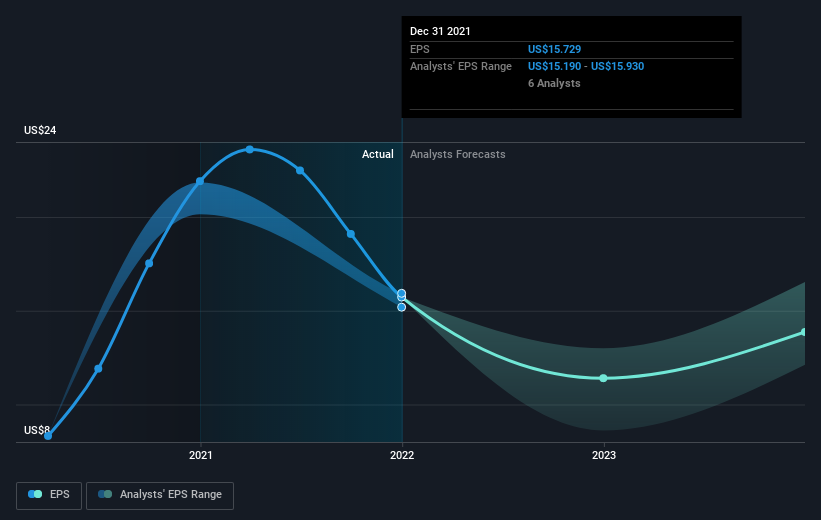- United States
- /
- Diversified Financial
- /
- NYSE:PFSI
PennyMac Financial Services (NYSE:PFSI) sheds 3.6% this week, as yearly returns fall more in line with earnings growth

It hasn't been the best quarter for PennyMac Financial Services, Inc. (NYSE:PFSI) shareholders, since the share price has fallen 24% in that time. But that doesn't change the fact that the returns over the last five years have been very strong. It's fair to say most would be happy with 226% the gain in that time. We think it's more important to dwell on the long term returns than the short term returns. Of course, that doesn't necessarily mean it's cheap now.
While the stock has fallen 3.6% this week, it's worth focusing on the longer term and seeing if the stocks historical returns have been driven by the underlying fundamentals.
Check out our latest analysis for PennyMac Financial Services
In his essay The Superinvestors of Graham-and-Doddsville Warren Buffett described how share prices do not always rationally reflect the value of a business. By comparing earnings per share (EPS) and share price changes over time, we can get a feel for how investor attitudes to a company have morphed over time.
During five years of share price growth, PennyMac Financial Services achieved compound earnings per share (EPS) growth of 43% per year. The EPS growth is more impressive than the yearly share price gain of 27% over the same period. So it seems the market isn't so enthusiastic about the stock these days. This cautious sentiment is reflected in its (fairly low) P/E ratio of 2.90.
You can see how EPS has changed over time in the image below (click on the chart to see the exact values).

We know that PennyMac Financial Services has improved its bottom line over the last three years, but what does the future have in store? This free interactive report on PennyMac Financial Services' balance sheet strength is a great place to start, if you want to investigate the stock further.
What About Dividends?
When looking at investment returns, it is important to consider the difference between total shareholder return (TSR) and share price return. The TSR incorporates the value of any spin-offs or discounted capital raisings, along with any dividends, based on the assumption that the dividends are reinvested. It's fair to say that the TSR gives a more complete picture for stocks that pay a dividend. In the case of PennyMac Financial Services, it has a TSR of 243% for the last 5 years. That exceeds its share price return that we previously mentioned. And there's no prize for guessing that the dividend payments largely explain the divergence!
A Different Perspective
While the broader market gained around 6.4% in the last year, PennyMac Financial Services shareholders lost 16% (even including dividends). However, keep in mind that even the best stocks will sometimes underperform the market over a twelve month period. Longer term investors wouldn't be so upset, since they would have made 28%, each year, over five years. It could be that the recent sell-off is an opportunity, so it may be worth checking the fundamental data for signs of a long term growth trend. I find it very interesting to look at share price over the long term as a proxy for business performance. But to truly gain insight, we need to consider other information, too. Even so, be aware that PennyMac Financial Services is showing 3 warning signs in our investment analysis , and 1 of those is a bit unpleasant...
For those who like to find winning investments this free list of growing companies with recent insider purchasing, could be just the ticket.
Please note, the market returns quoted in this article reflect the market weighted average returns of stocks that currently trade on US exchanges.
New: Manage All Your Stock Portfolios in One Place
We've created the ultimate portfolio companion for stock investors, and it's free.
• Connect an unlimited number of Portfolios and see your total in one currency
• Be alerted to new Warning Signs or Risks via email or mobile
• Track the Fair Value of your stocks
Have feedback on this article? Concerned about the content? Get in touch with us directly. Alternatively, email editorial-team (at) simplywallst.com.
This article by Simply Wall St is general in nature. We provide commentary based on historical data and analyst forecasts only using an unbiased methodology and our articles are not intended to be financial advice. It does not constitute a recommendation to buy or sell any stock, and does not take account of your objectives, or your financial situation. We aim to bring you long-term focused analysis driven by fundamental data. Note that our analysis may not factor in the latest price-sensitive company announcements or qualitative material. Simply Wall St has no position in any stocks mentioned.
About NYSE:PFSI
PennyMac Financial Services
Through its subsidiaries, engages in the mortgage banking and investment management activities in the United States.
Good value with moderate growth potential.
Similar Companies
Market Insights
Community Narratives




